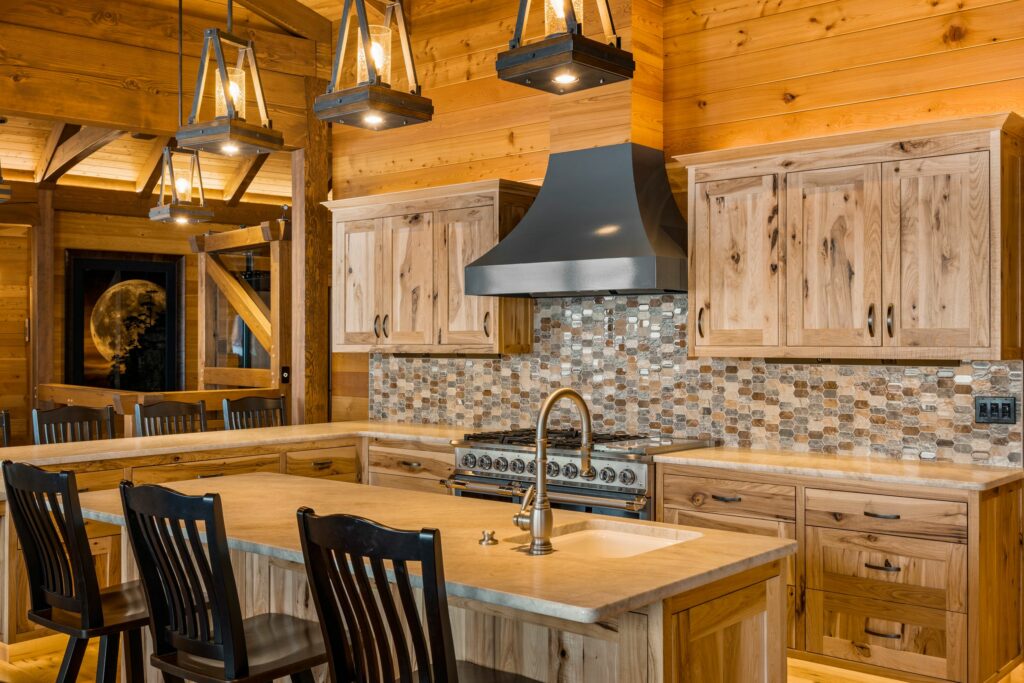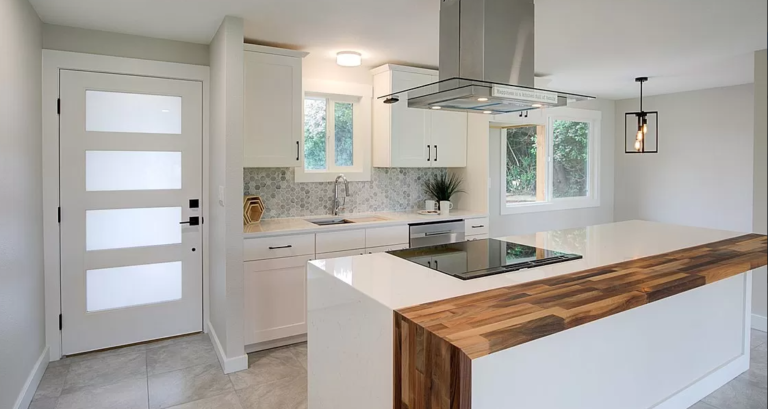In the dynamic landscape of interior design, choosing the right countertops for your home is a pivotal decision. Especially in the moisture-rich and ever-changing climate of the Pacific Northwest, durability and practicality are of utmost importance. While the rustic charm of wooden butcher block countertops might hold an allure, opting for granite, quartz, or porcelain slab countertops proves to be a more sensible and long-lasting choice for the region. As your Puget Sound Countertop Experts, we’ve done butcher block countertops in the past at Tops and in our experience, the hype just doesn’t jive with reality of using wooden countertops everyday in a real-world environment. In this article, we’ll delve into why these materials outshine wooden butcher blocks in this environment.
Stone Countertops Offer Durability for Ever-Changing Weather Conditions
The Pacific Northwest’s unpredictable climate is notorious for its rapid fluctuations between moisture and dryness. Wooden butcher block countertops, however sturdy they may seem, are prone to swelling and warping when exposed to excessive humidity or sudden temperature changes. Unlike their wooden counterparts, granite, quartz, and porcelain slab countertops possess unparalleled resistance to environmental shifts, remaining stable and intact through the changing seasons. Nothing outlasts stone and clay!
Stone Offers Resistance to Mold and Mildew
One of the most common drawbacks of wooden countertops is their susceptibility to mold and mildew growth. The Pacific Northwest’s damp environment creates an ideal breeding ground for these unwelcome intruders. In contrast, materials like granite, quartz, and porcelain are naturally non-porous, providing an inhospitable environment for mold and mildew to take root. This not only ensures a healthier and safer kitchen but also saves you from the hassle of constant maintenance and cleaning that wooden surfaces demand.
Low Maintenance and Longevity vs Wooden Butcher Block
Wooden butcher block countertops might appear inviting with their rustic charm, but they demand meticulous care to maintain their beauty and longevity. Regular sealing and oiling are necessary to prevent drying, cracking, and staining. Granite, quartz, and porcelain, on the other hand, require minimal upkeep. Their hard, non-porous surfaces naturally resist staining, scratching, and chipping. With these materials, you can spend more time enjoying your kitchen and less time fretting over maintenance.
Stone Countertops Offer Better Heat and Scratch Resistance
The culinary enthusiasts of the Pacific Northwest deserve countertops that can withstand the rigors of daily kitchen activities. Wooden butcher block countertops may suffer from heat damage and knife scratches over time, leading to a prematurely aged appearance. On the contrary, granite, quartz, and porcelain slabs boast impressive heat resistance and exceptional scratch resistance, ensuring that your countertops remain beautiful and functional for years to come.
Variety and Aesthetics
While wooden butcher block countertops may exude a cozy, rustic ambiance, they might not seamlessly integrate into all design styles. Granite, quartz, and porcelain offer a diverse range of colors, patterns, and finishes that cater to a wider spectrum of interior aesthetics. Whether you prefer the elegance of granite’s natural patterns, the sleekness of quartz’s engineered surfaces, or the modern versatility of porcelain slabs, you’re bound to find a material that complements your home’s overall design.

When it comes to selecting the ideal countertops for your Pacific Northwest home, making a decision rooted in practicality and longevity is paramount. While wooden butcher block countertops might hold sentimental value, the challenges they pose in terms of durability, maintenance, and functionality in the region’s unique climate cannot be ignored. In contrast, granite, quartz, and porcelain slab countertops emerge as the clear winners, offering a harmonious blend of resilience, aesthetics, and ease of maintenance.
If you love the rustic look of wood consider refinishing your cabinets in a natural tone instead. The initial cost and ongoing maintenance of natural wood cabinets are significantly lower than the ongoing maintenance required for butcher block countertops. By opting for natural stone, porcelain, or quartz materials, you’re not just making a prudent investment in your kitchen’s future; you’re also ensuring that your countertops remain a source of pride and functionality for years to come. Say goodbye to the pitfalls of wooden butcher block countertops and embrace the enduring allure of granite, quartz, and porcelain slabs – your kitchen deserves nothing less. You can learn more about our in-stock countertop offerings here.
Got follow-up questions? Need a cabinet company recommendation? We can help!
